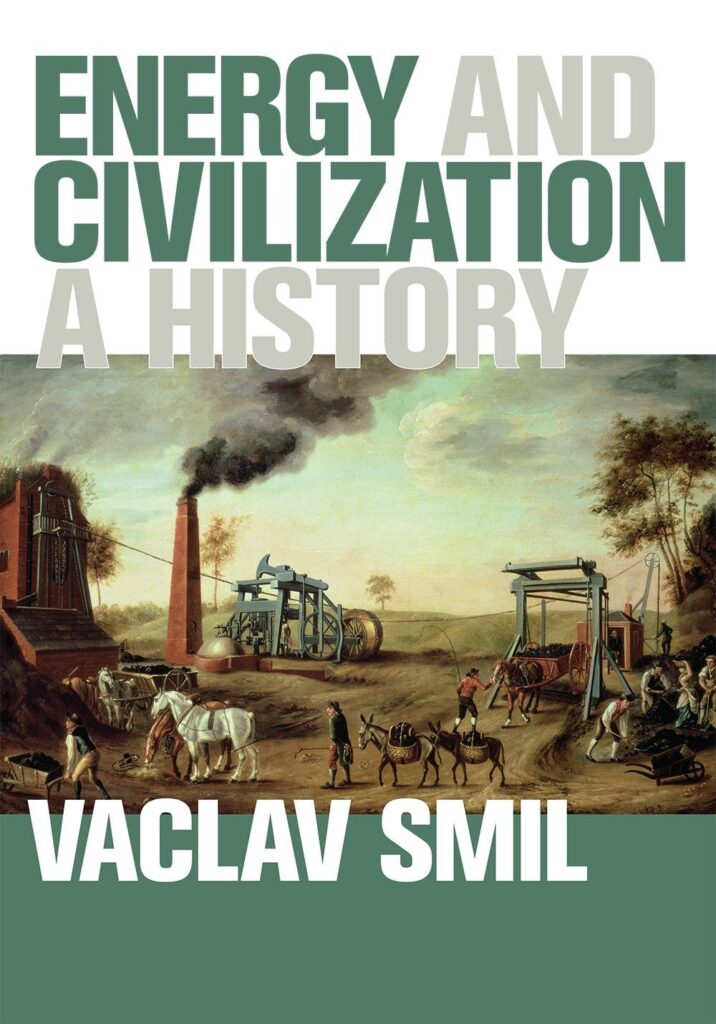
A comprehensive account of how energy has shaped society throughout history, from pre-agricultural foraging societies through today’s fossil fuel-driven civilization.
Energy is the only universal currency; it is necessary for getting anything done. The conversion of energy on Earth ranges from terra-forming forces of plate tectonics to cumulative erosive effects of raindrops. Life on Earth depends on the photosynthetic conversion of solar energy into plant biomass. Humans have come to rely on many more energy flows—ranging from fossil fuels to photovoltaic generation of electricity—for their civilized existence. In this monumental history, Vaclav Smil provides a comprehensive account of how energy has shaped society, from pre-agricultural foraging societies through today’s fossil fuel–driven civilization.
Humans are the only species that can systematically harness energies outside their bodies, using the power of their intellect and an enormous variety of artifacts—from the simplest tools to internal combustion engines and nuclear reactors. The epochal transition to fossil fuels affected everything: agriculture, industry, transportation, weapons, communication, economics, urbanization, quality of life, politics, and the environment. Smil describes humanity’s energy eras in panoramic and interdisciplinary fashion, offering readers a magisterial overview. This book is an extensively updated and expanded version of Smil’s Energy in World History (1994). Smil has incorporated an enormous amount of new material, reflecting the dramatic developments in energy studies over the last two decades and his own research over that time.
Marxist drivel. Go and fuck yourself Kennedy.
Nilen renner gjennom tre klimasoner og elleve land med til sammen mer enn tusen folkeslag og snart en halv milliard mennesker. I denne boken fortelles . . .
A sweeping account of the social and political world of the Roman emperors by “the world’s most famous classicist” ( Guardian ). In her international . . .
Terje Tvedt er en fornuftens stemme i en forvirret tid. I Norske tenkemåter. Tekster 2016-2024 blir samtidens dominerende perspektiver endevendt og maktens tenkemåter avdekket.Tvedt viser . . .
Pax is the third in a trilogy of books narrating the history of the Roman Empire. The series that began with Rubicon, and continued with . . .
In the fifth century B.C., a global superpower was determined to bring truth and order to what it regarded as two terrorist states. The superpower . . .
I Historiens hjul og vannets makt utfordrer Terje Tvedt rådende fortolkninger av et av verdenshistoriens mest betydningsfulle spørsmål – den moderne verdens fremvekst og den . . .
For oss nordmenn er vann en selvsagt ting. Så enkelt er det ikke for alle, i andre deler av verden. I dette første programmet tar . . .
I dette programmet skal vi se på vannveienes betydning for bydannelse, transport og handel. Demninger og kanaler innebærer kontroll over elvene. Vi skal ta seerne . . .
Hvorfor er det vann som forener barnet med Gud? Hvorfor brenner likbålene ved bredden av Ganges i India? Hvorfor drar millioner av syke mennesker til . . .
Vann forurenses og overutnyttes. Hvem skal få rent drikkevann? Tilgangen på rent vann vil avgjøre velferdsutviklingen og livsstandarden. Framtidas kriger kan bli en kamp om . . .
An extraordinary exploration of the ancestry of Britain through seven burial sites. By using new advances in genetics and taking us through important archaeological discoveries, . . .
Volume III investigates what Braudel terms «world-economies»―the economic dominance of a particular city at different periods of history, from Venice to Amsterdam, London, New York. . . .